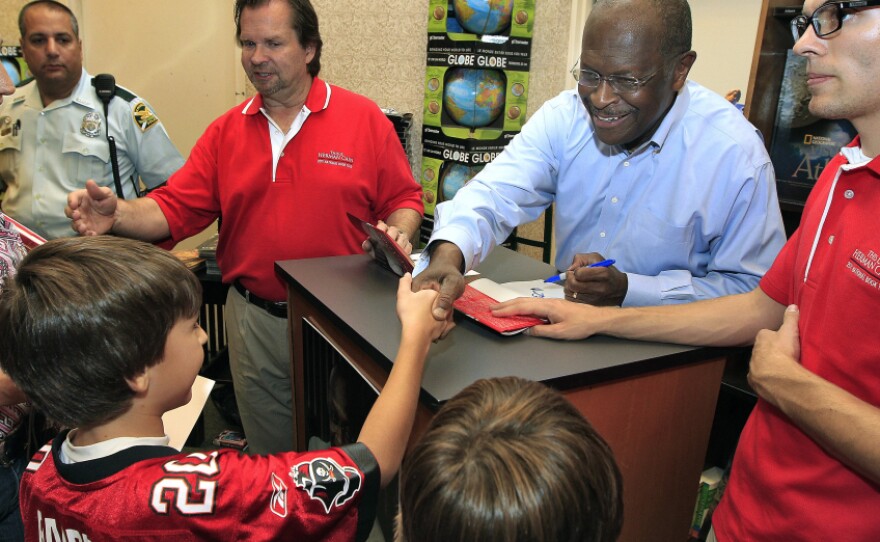Only one Republican will win his or her party's presidential nomination. But for the remaining contenders, there can be other benefits. If a candidate has written a book — as most of the current GOP hopefuls have --a campaign can double as one big book tour. Primaries and caucuses provide a big stage, and this year it's sometimes hard to tell the politics from a promotional event.
Books by presidential candidates are nothing new; they're a time-honored device to lay out both a personal story and policy proposals. The all-time sales champ in this category is Barack Obama's The Audacity of Hope, which sold more than 400,000 copies in 2008 alone.
In the current campaign, the bookshelf is loaded.
There's Mitt Romney's No Apology: The Case for American Greatness. He talked about the book on the Today show last year. Texas Gov. Rick Perry's book is called Fed Up!: Our Fight to Save America from Washington. He too went on Today before he became a candidate.
"If there is a better signal of my plan for the future of not running for the presidency of the United States, it's this book," Perry said in November 2010. "Anyone running for the presidency is not going to take on these issues with the power that I do."
Texas Rep. Ron Paul, meanwhile, has been writing books for almost two decades. His most recent is called Liberty Defined: 50 Essential Issues That Affect Our Freedom. He visited The View this year before officially jumping into the race.
Longtime publisher Peter Osnos, who has worked on many political books, says it's a medium in which the candidate has total control.
"If you can get somebody to buy it, a book has a great virtue," Osnos says. "It's just you and the reader. There is no interviewer; there is nobody to get in the way."
Rep. Michele Bachmann releases her new book next week. Though it's relatively late in the campaign season, Bachmann — who has slumped in the polls after a strong start — will use the occasion to reintroduce herself to voters.
But the commingling of candidate books and the campaign itself raises some questions.
"You can ask in a way, 'Is the book there to sell a presidential candidacy?' but in some cases you may wonder if the candidacy is there to sell the book," says Dennis Goldford, a political scientist at Drake University.
Two candidates who stand out in this field for their aggressive approach to product promotion are former House Speaker Newt Gingrich and businessman Herman Cain.
Gingrich is a prolific author and has written dozens of books on politics and history. He co-authored a brand-new novel set during the Civil War, and he produces movies. His latest film is A City Upon A Hill: The Spirit Of American Exceptionalism. Additionally, emails from Gingrich to reporters are often about a movie or a book he is selling.
Cain's book, meanwhile, is called This is Herman Cain: My Journey To The White House. His travel schedule has prompted many to wonder if it's all really about selling books. Visits to Iowa have been rare — instead he has been in Arkansas, Tennessee, Wisconsin and other places far from the early caucus and primary action.
Cain addressed the assertion that his ultimate goal is to land a TV show, like former candidate Mike Huckabee did after his failed 2008 presidential run.
"If you know Herman Cain, nothing is further from the truth," Cain said in October. "If you don't believe me, I invite you to get a copy of my new book, This is Herman Cain, if you can find one, because they are selling like hotcakes."
Cain made the comments before allegations of past sexual harassment and an awkward answer to a question about Libya that went viral.
Any candidate would worry about the impact of such things on a political campaign. But selling oneself as an author or a TV host or commentator is another matter. Constituents there can be much more forgiving.
Copyright 2025 NPR







